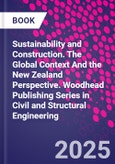The authors’ unique treatment of the overarching themes impacting sustainability in the global construction industry and their intersection with the local context (i.e., New Zealand), offers a well-balanced and thoroughly researched resource. It proves to be a value-added, highly visual text for engineers, students, researchers, policy makers, and various industry stakeholders alike.
Table of Contents
Preamble1. Sustainability and the Construction Context
2. Planning for Construction
3. Design and Design Management
4. The Construction Process
5. Project Delivery
6. Supply Chain and Logistics
7. Operation, Maintenance, and End of Life
8. Waste and Waste Management
9. Life Cycle Assessment and Building Rating Systems
10. Technology in Construction
11. The Living Building
12. Corporate Sustainability and its Assessment, Benchmarking, and Reporting
13. The Stakeholder Perspective
14. The ‘Wicked' Problem of Sustainable Construction in New Zealand
Appendix
Authors
Kamal Dhawan Lecturer, School of Future Environments, Auckland University of Technology, Auckland, New Zealand.Dr. Kamal Dhawan holds a BTech in Mechanical Engineering from Jawaharlal Nehru University, an MTech in Production Engineering from the Indian Institute of Technology Delhi, India, and a PhD in Construction Logistics from Auckland University of Technology, New Zealand. His principal areas of expertise are Engineering Asset Management, Sustainability of Transport and Logistics and their climate change impacts, and Sustainable Construction. He has had extensive experience in managing specialist supply chains and logistics across international borders including both Indian as well as foreign entities. He currently lectures on Construction Logistics, Construction Equipment, and Sustainable Construction at Auckland University of Technology, New Zealand.
John E. Tookey Professor and Deputy Head, School of Future Environments, Auckland University of Technology, Auckland, New Zealand.
Professor John E. Tookey holds a BSc in Technology and Management Science and a PhD in Industrial Engineering from the University of Bradford, UK. He has an extensive track record of program development, governance and research in construction management and related disciplines. Professor Tookey joined Auckland University of Technology, New Zealand in 2009. His areas of principal expertise include construction management, logistics, supply chain management, productivity, procurement, building costs, and BIM. He has been involved in numerous funded research projects addressing the logistics of construction materials and waste, construction productivity, housing productivity, and lean construction. Professor Tookey has introduced over 10 undergraduate and post graduate programs in construction at various institutions in the UK and New Zealand. In addition to research and publication, he is a regular media commentator on housing and infrastructure issues.
Ali GhaffarianHoseini Professor and Head of the Built Environment Engineering Dept., School of Future Environments, Auckland University of Technology, Auckland, New Zealand.Professor Ali GhaffarianHoseini is a senior academic strategist and visionary leader with over two decades of expertise in academic management and transformational change. He serves on the Prime Minister's Chief Science Advisor AI Reference Group, as an Evaluator for New Zealand's Ministry of Business, Innovation and Employment, and as a Royal Society Te Aparangi College of Assessors Delegate. At Auckland University of Technology, he holds key roles and is renowned in Architectural Engineering, Green Building, and Smart Cities. With 200+ international patents and publications, his research integrates advanced technologies with sustainable development. He has led global collaborations, secured major funding, and earned numerous awards. As a curriculum leader, he developed accredited programs, founded research labs, and mentored academics. An international assessor for prestigious organizations and government projects, he co-founded the RESPONSIVE + GREEN Urban Built Environment Lab, driving sustainable urban innovation. His global partnerships significantly advance research and education in sustainable built environments.
Amirhosein GhaffarianHoseini Associate Professor and Director of Postgraduate and Doctoral Studies, School of Future Environments, Auckland University of Technology, Auckland, New Zealand.Professor Amirhosein GhaffarianHoseini is a distinguished academic in architecture and urban transformation, with over 20 years of experience leading national and international teams in New Zealand, Canada, and Malaysia. A recipient of numerous prestigious awards, he is globally recognized for his innovative approach and serves as an expert assessor for the Ministry of Business, Innovation and Employment and the Royal Society Te Aparangi. He also advises the New Zealand Prime Minister's Chief Science Advisor. Professor Amir has been an examiner for various institutions, including the Swiss National Science Foundation, the Austrian Research Promotion Agency (FFG), and the Austrian Science Fund (FWF). He chairs the Postgraduate Board of Studies for the Faculty of Design and Creative Technologies and the School of Future Environments at Auckland University of Technology. As a leading researcher, architectural designer (NZIA academic), and urbanist, his work explores sustainable and healthy design, smartification, and the evolving relationship between architecture, urban environments, and end users, with a particular focus on buildings' influence on the urban microclimate and the future of cities.








